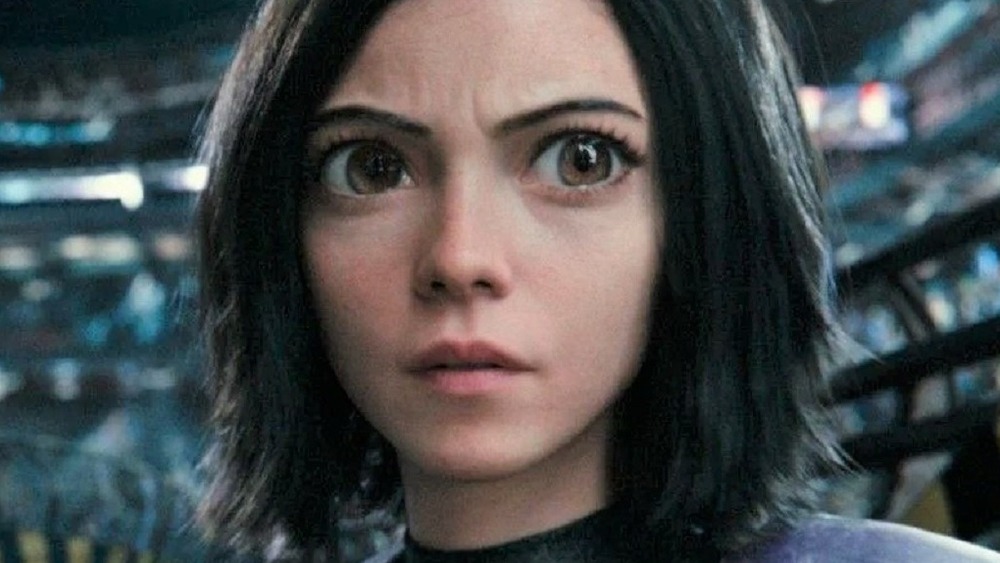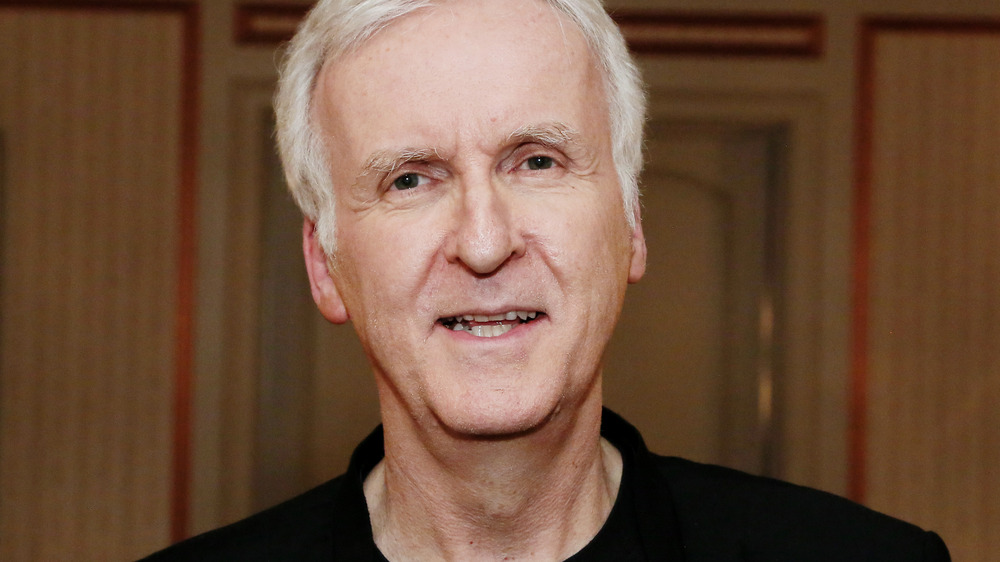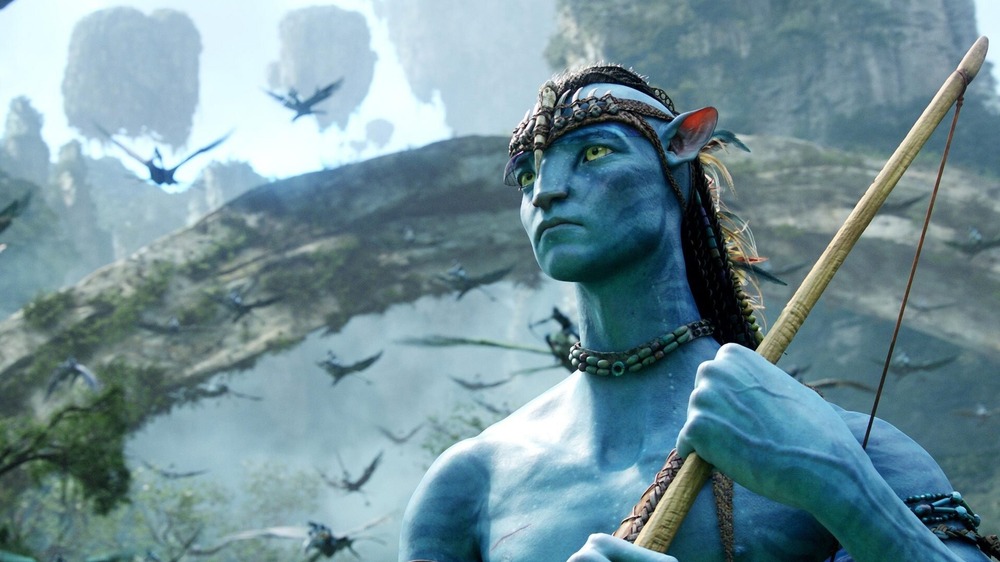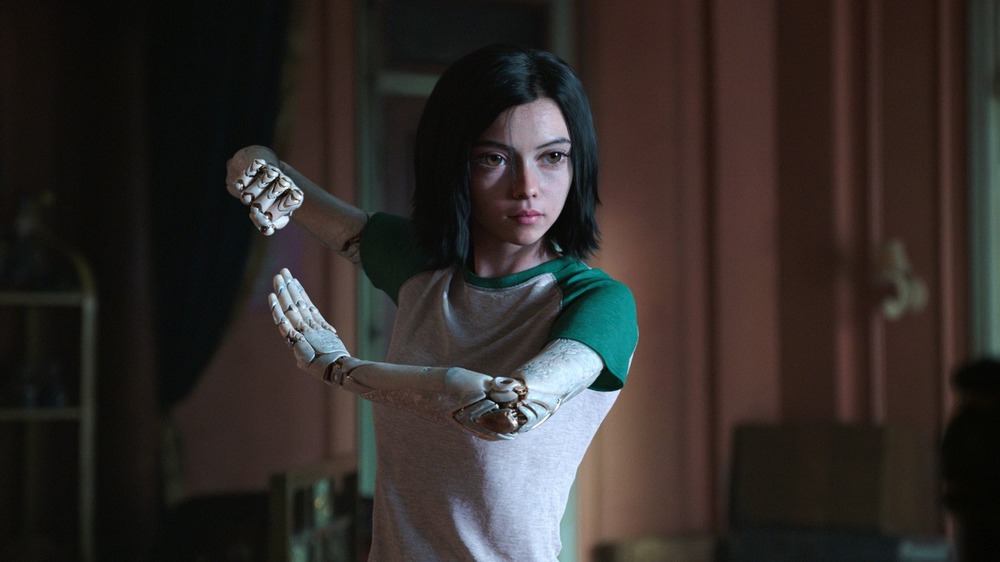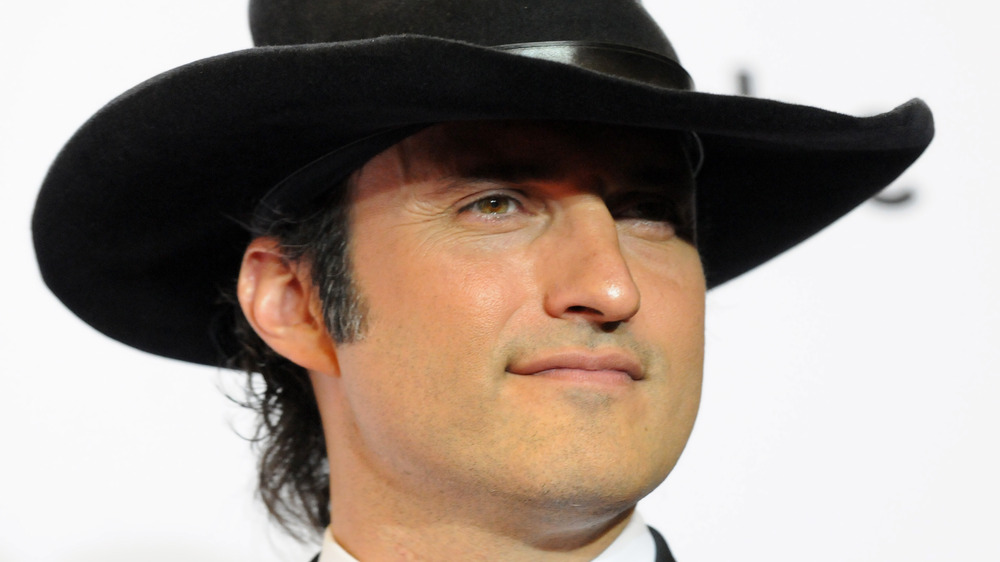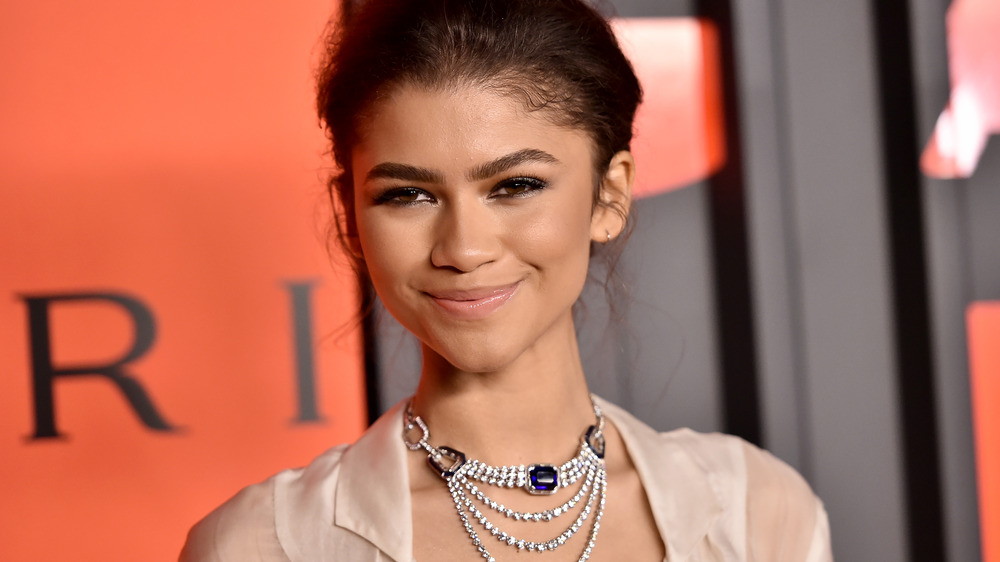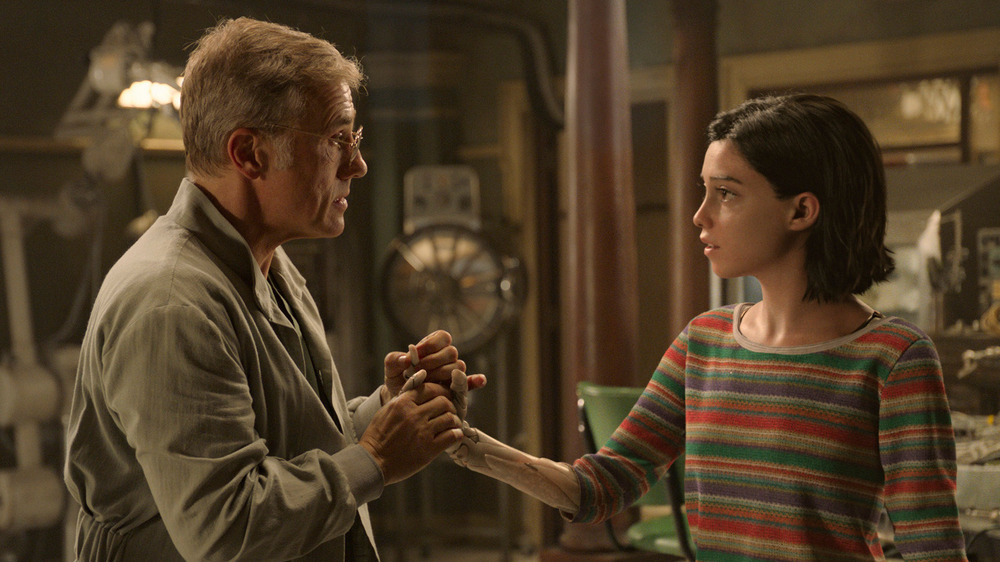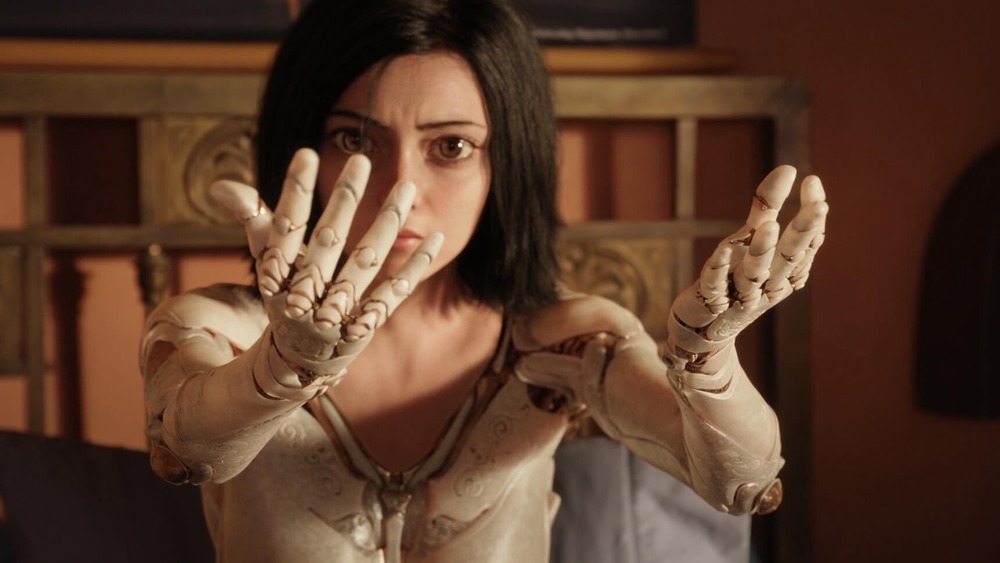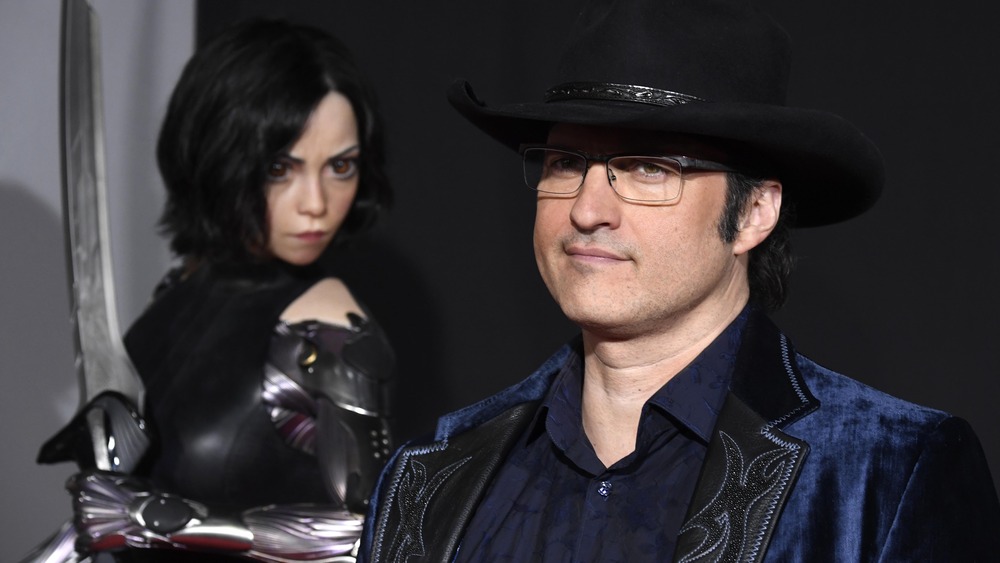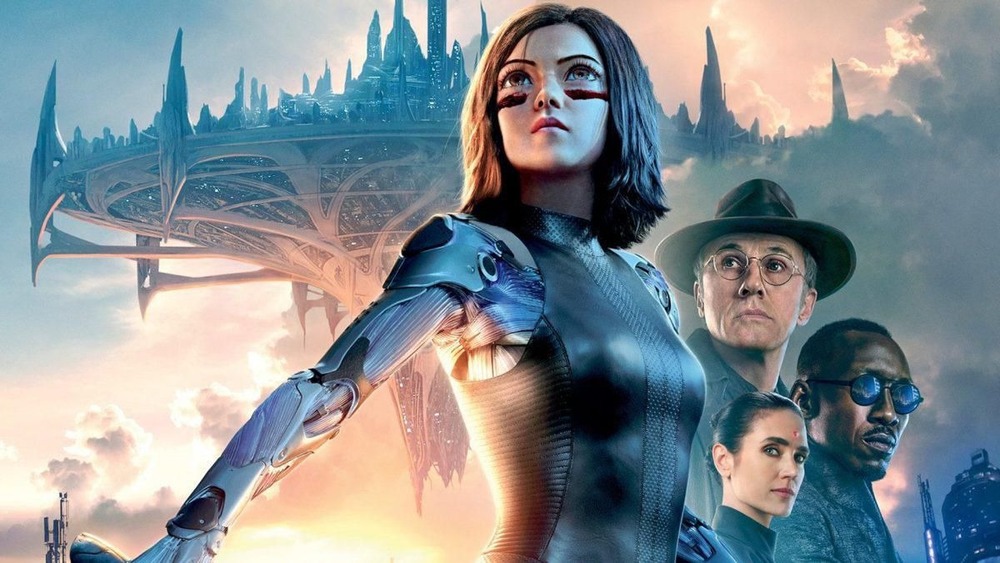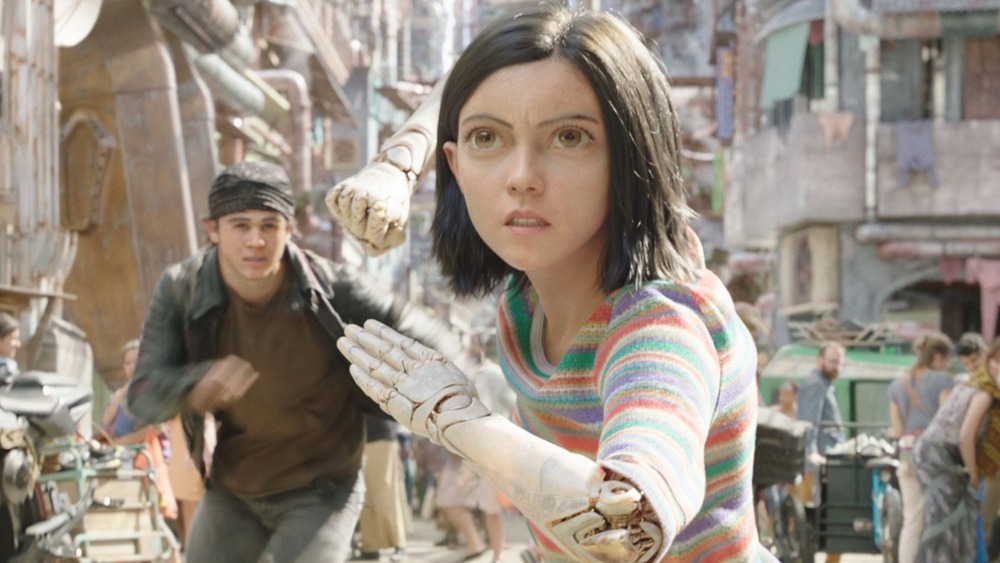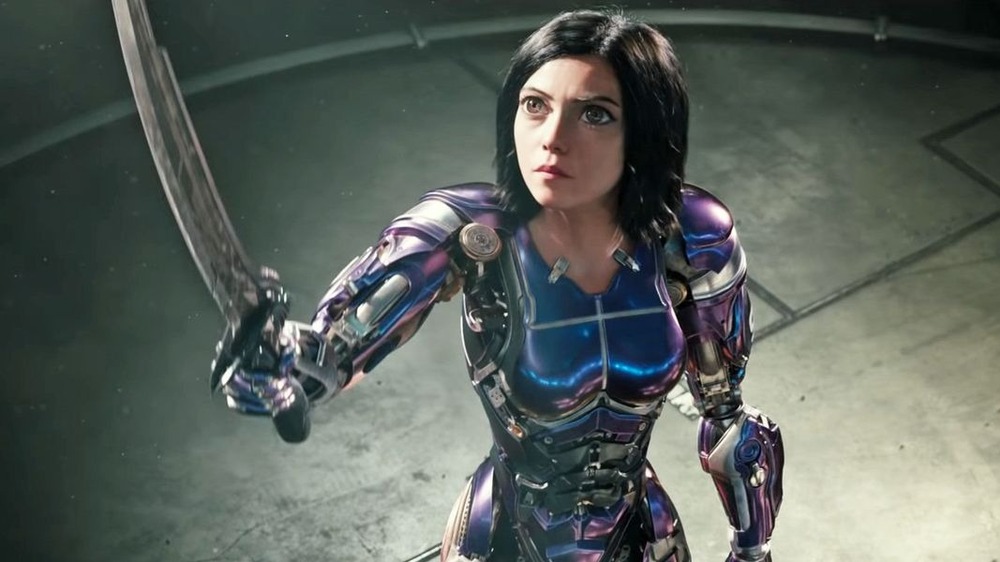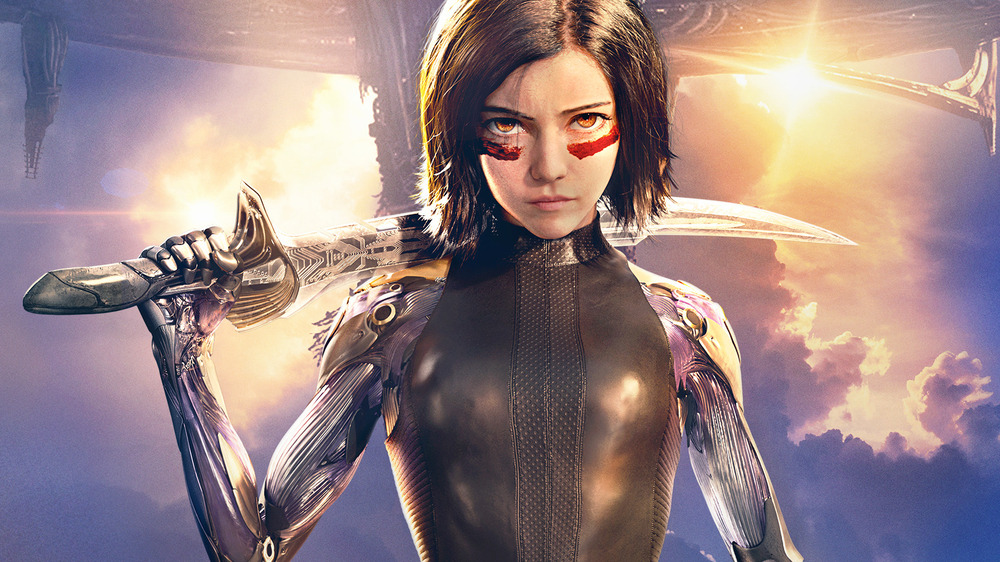The Untold Truth Of Alita: Battle Angel
Alita: Battle Angel, based on the 1990s manga Battle Angel Alita, debuted in theaters in February 2019 after years of prep time courtesy of writer/director Robert Rodriguez and writer/producer James Cameron. It wasn't the usual kind of blockbuster fare, thanks its slavish devotion to replicating the over-the-top imagery of its source material, as well as the presence of an entirely digital protagonist with enormous eyes. Though it didn't set the box office alight with success, its unique qualities did manage to inspire a fervent fan following, which has helped to keep it in the pop culture conversation since its debut.
However, even with Alita being a fixture of sci-fi cinema discourse in recent years, there's still plenty of unusual behind-the-scenes aspects of the film that haven't been widely discussed. Given that Cameron toiled away on making this movie for decades, it shouldn't be a surprise that the process in bringing Alita: Battle Angel to theaters is rife with revealing yarns, in addition to the complexities of bringing any big-budget affair to life. In looking at these untold aspects of Alita: Battle Angel, you realize that this movie is definitely detailed enough to warrant all the discussion its generated since it first leaped onto the silver screen.
James Cameron began developing Alita in 2000
Though Alita: Battle Angel premiered in theaters in February 2019, James Cameron had been developing the project for quite a while. In fact, Cameron was pursuing Alita all the way at the dawn of the 21st century. Back in June 2000, news sprung up that 20th Century Fox had registered a website domain related to Alita for Cameron. At the time, Fox had no comment on what specific plans they had for this webpage. Coming less than three years after Cameron's Titanic had dominated the planet, though, grabbing that site couldn't help but draw eyeballs. It seemed to be news that positioned Alita as the next directorial effort from the King of the World.
As history has proven, though, all that speculation circa. 2000 never happened. Though he went back and forth on which project to do as his next directorial effort, Cameron eventually shifted his sights onto Avatar. His connection to Alita would be further distanced once the director's chair on Alita was filled by Robert Rodriguez. Still, Cameron remained an integral creative partner on the project. The fact that he was pursuing this endeavor all the way back in 2000 speaks to his enduring passion for the world of Alita.
Alita: Battle Angel was supposed to happen before Avatar
As the 21st century began, Cameron — always one to push the envelope for visual effects — was looking to make movies starring entirely digital characters. Both Alita and Avatar were being eyeballed by the auteur as ways of realizing those ambitions, with the former initially being the one Cameron planned to make into a groundbreaking reality first.
"We're in pre-production right now on a project called Battle Angel," Cameron said back in November 2004 (via Anime News Network), adding, "A couple things that will be interesting about this project, even though it's a live-action film, the main character will be done with CG animation, and the second thing that's interesting is that we'll be shooting it in 3D using the stereo imaging system that we've been developing for the documentaries." Cameron's visual effects ambitions for the project were clear from the get-go, while his explicit mention of Battle Angel being in pre-production made it obvious he planned to get to the film next.
However, plans eventually changed. Cameron debated between whether he'd direct Avatar or Battle Angel next, but camera tests eventually led him to pursuing the former instead. In the process, Alita went from being a top priority to getting shifted to Cameron's backburner.
Cameron was working on the visual effects back in 2005
It can take a while for a movie's visual effects work to come together just right. That's why a number of blockbusters begin working on their most VFX-heavy sequences before principal photography even begins. In the case of Alita: Battle Angel, it shouldn't be shocking to discover that the cutting-edge technology used to bring those robotic characters to life was being worked on long before cameras started rolling. However, what is surprising is just how long this VFX technology was being fine-tuned. Alita: Battle Angel's VFX was being worked on for more than a decade before it ever hit the silver screen.
According to a May 2006 profile from Variety, James Cameron had spent "the past 10 months" working on the visual effects technology necessary to bring the movie to life. Cameron, even at these earliest stages, planned to render Alita as an entirely digital creation, so he wanted to make sure the technology used for this protagonist was just right. Of course, Cameron's early prep work didn't pan out, as he focused his attention on Jake Sully and his adventures on Pandora. Still, having Alita's VFX date all the way back to 2005 reflects Cameron's determination to render this anime character right in live-action.
Robert Rodriguez was just supposed to revive Alita's script
Robert Rodriguez doesn't frequently play in the sandbox of big-budget movies. He's certainly made VFX-heavy features, but $100+ million budgeted titles — the kind that made James Cameron one of the most successful directors in the world — aren't exactly Rodriguez's forte. But he embraced this style of filmmaking with aplomb when he took on Alita: Battle Angel. Originally, though, Rodriguez's participation with Alita was meant to be far more casual.
Initially, Rodriguez was simply called in to help par down the initial screenplay. "I saw James Cameron's original drawings, and they took my breath away," Rodriguez recounted (via Cinema Blend). "The main character had porcelain arms and huge manga eyes, and I thought, 'Wow, he's going full manga with this.' And he trusted me with the version that was in his head, and he said, 'If you fix the script for me, you can direct.' So a month later I come back and say, 'Here you go, free of charge.' And he said, 'All right, it's yours.'" After that, Rodriguez went from being a screenwriter on Alita: Battle Angel to being its sole director.
Zendaya was a contender to play Alita
Alita actress Rosa Salazar became one of the most acclaimed parts of Alita: Battle Angel, with critics praising how she was able to convey a richly human performance through all that motion-capture animation technology. Monica Castillo of RogertEbert.com, for instance, echoed frequent praise for Salazar's richly human turn by noting how she "smooths over many of [the] cumbersome [story] details with her earnest motion-captured performance. She physically leans into the awkwardness of walking around as a teen girl bot. ... She explores her new surroundings with literal wide-eyed wonder." However, despite how widely beloved Salazar's Alita has become, she wasn't always the only person in contention for the role.
Originally, the role of Alita: Battle Angel came down to a number of actresses, including future Spider-Man mainstay Zendaya. The Hollywood Reporter stated in April 2016 that Zendaya, Salazar, and It Follows lead Maika Monroe were all the finalists for the role of Alita. Bella Thorne was also mentioned as a name in consideration for the part. Interestingly, at the time, THR said that Zendaya was the frontrunner for the role but cautioned that the performer's commitments to her Disney Channel program, K.C. Undercover, could provide insurmountable scheduling conflicts. It turned out those conflicts were impossible to resolve, and Zendaya failed to secure the role of Alita, while other contenders like Monroe and Thorne also fell to the wayside. Instead, Salazar took on the part, forever altering her career in the process.
Alita: Battle Angel was shot in Austin, Texas
Robert Rodriguez needed to make a number of changes to his filmmaking style when tackling Alita: Battle Angel. The man famous for handling all behind-the-scenes elements of his productions had to hand over the reins of cinematography, music, and editing to other people. Meanwhile, the sheer scope of the entire endeavor meant he had to pull back on some of his most outlandish tendencies. One thing that didn't change, though, was that Alita was shot in Rodriguez's go-to filming location of Austin, Texas.
The home of Rodriguez's Troublemaker Studios, Alita shot on soundstages in the city, with apparently the entire feature being filmed there. This makes it a rare big-budget production to shoot in Texas. Many blockbusters opt to shoot elsewhere thanks to tax incentives. However, those concerns weren't going to shoo away Rodriguez. In fact, he's got a sense of loyalty fueling his ambitions to shoot his films in this famous Texas city. "Richard Linklater and I both live there, and I have to say, by staying in your community and making your movies there, and using local workers, it creates a ripple effect that is ultimately huge," Rodriguez explained to The Irish Times. With that kind of potential positive impact, it's no wonder that Alita: Battle Angel and its backdrop of Iron City found a home in the Lone Star State.
Alita: Battle Angel went through numerous release dates
Initially, Alita: Battle Angel was scheduled to debut on July 20, 2018. It was a prime summertime release date befitting of a sci-fi blockbuster that carried tons of spectacle and a massive budget. It even released its first trailer in time to go out with Star Wars: The Last Jedi in anticipation of this release date. Two months after that trailer premiered, though, a major shift happened. Alita was moved to December 21, 2018. No official reason was given for this shift, but it was presumably done to mirror the Christmas dates assigned to prior James Cameron movies Titanic and Avatar. It's also likely Fox wanted some distance between Alita and other July 2018 tentpoles like Mission: Impossible – Fallout and Ant-Man and the Wasp.
Christmas 2018 was a busy corridor for major blockbusters thanks to the likes of Spider-Man: Into the Spider-Verse, Aquaman, and Bumblebee. It's easy to imagine a non-sequel like Alita getting lost in all that big-budget shuffle. And 20th Century Fox appeared to be cognizant of that scenario, too, seeing that they delayed Alita again just three months before December 2018. Now, Alita was scheduled to drop on February 14, 2019, with Variety noting that the date was chosen in the hopes of it being a strong launchpad for its Chinese box office. In other words, it took this sci-fi film a long time to find its home on the calendar.
It's the highest-grossing Robert Rodriguez movie ever
Alita: Battle Angel did okay but not fantastic at the worldwide box office. Thanks to a lack of new American blockbusters in the first two months of 2019, it managed to do significantly better domestically than many other live-action anime adaptations, but it still grossed just $85.8 million domestically. Thanks to overseas grosses, including a strong gross in the territory of China, Alita brought its worldwide box office haul to $401.9 million. That isn't spectacular on a budget that's been speculated to range from $170 million to a whopping $200 million. However, it's a decent gross on a number of levels, including being the rare American movie to exceed $400 million worldwide without cracking $100 million domestically.
An even more notable box office achievement Alita scored without question was becoming director Robert Rodriguez's biggest movie ever at the worldwide box office. With $401.9 million, Alita easily leaped past Rodriguez's previous biggest movie ever, the $197.6 million gross of the first Spy Kids. Of course, this isn't exactly a shocking development given that Rodriguez hadn't previously dabbled in the kinds of movies that make over $400 million worldwide. When many of your features are low-budget grindhouse homages like Machete, of course a broadly-appealing tentpole like Alita will become your highest-grossing directorial effort. However, it's still a noteworthy achievement for Alita: Battle Angel, especially considering that its box office run as a whole didn't quite meet expectations.
Star-studded cameos were sequel set-ups
Throughout Alita: Battle Angel, a handful of big-name actors show up for brief appearances. Jai Courtney pops up as legendary Motorball player Jashugan, and Edward Norton appears as the film's ultimate villain, Nova. In the moment, they're just further evidence of the larger world that Alita occupies. In the broader context, though, these characters and their respective performers were all supposed to pay off in potential follow-ups to Alita: Battle Angel.
"We had to cast [these] people without really having a part for them to be basing it on to see if they wanted to do it," Rodriguez said about these star-studded cameos. "There was no script for a future one. So we went to people we knew." According to Rodriguez, these Alita cameos were the last casting they did on the film because "they were small enough we didn't need to shoot them right away, and it gave us time to figure out who to go to that we really liked that would fit the role, and we could fill that promise later down the road with the sequel." While the future of Alita: Battle Angel as an ongoing cinematic universe is uncertain, if any sequels do emerge, the first movie has ensured that a handful of big actors are ready to fill out critical characters.
Alita: Battle Angel has been seen as a trans allegory
You never know what movies will resonate with what audiences. Alita: Battle Angel is a great example of this. To our knowledge, nobody involved with this production was thinking that Alita would resonate as deeply personal for trans viewers. But in the wake of the film's initial release, a following sprang up that praised Alita for how its story worked as a trans allegory.
Writer Willow Maclay summarized how Alita resonated on this level by noting that the title character "is a robot who has to figure out what her body means and how she can change it to better fit herself." In addition to resonating on this personal level, there was also the fact that Alita was a character, albeit an allegorical one, who was a welcome contrast to most mainstream depictions of trans people. This robot coded as trans is depicted throughout Battle Angel as a warrior who becomes a symbol of hope. Meanwhile, traditional trans characters in Hollywood cinema are often torment-laden figures doomed to die in order to propel stories about cis-gendered people (see Dallas Buyers Club). Through these qualities, Alita: Battle Angel took on a whole new meaning for an entire community of sci-fi fans.
Alita: Battle Angel was the final film released by 20th Century Fox
Nobody involved with Alita: Battle Angel could've ever predicted the film would occupy a notable place in film history. However, that's just what happened when Alita: Battle Angel was released in the middle of February 2019. This release date meant that Alita, per Screen Rant, was the last title released by 20th Century Fox prior to the studio getting absorbed into Disney in March 2019.
This meant that nearly 85 years of 20th Century Fox existing as a non-Disney entity came to a close with Alita. Though there could never be a perfect closing film for a studio that encompassed so many eras of history, concluding on Alita meant that Fox went out with a feature hailing from one of its biggest go-to filmmakers, James Cameron. After all, the man behind Fox's two biggest movies at the worldwide box office, Avatar and Titanic, was also the producer and screenwriter behind the studio's final pre-Disney release. It also meant that Fox went out with a big-budget tentpole rather than a smaller-scale title that could've slipped through the pop culture cracks. Alita: Battle Angel has ended up standing for many different things for many different views, but one thing it can be universally seen as is the final release from one of Hollywood's longest-running studios.
Robert Rodriguez hasn't given up on Alita sequels
Initially, Alita: Battle Angel was meant to spawn further adventures, with Robert Rodriguez noting that, in rewriting the films, he discovered "a real lesson in creating a character that could go on [for multiple movies]." As he further explained (via Screen Rant), "Whether you have a franchise or not, you have a character that's so rich that the audience can imagine more movies with, those are the kinds of characters that I like." Unfortunately, Alita's worldwide box office was nowhere near big enough to immediately trigger a greenlight for such projects. Despite those issues, though, director Robert Rodriguez hasn't given up on seeing further Alita adventures.
As recently as January 2021, Rodriguez said that a follow-up could emerge thanks to the power of streaming services. "I think anything is possible. Disney bought Fox, and they have Disney+, so that is worth the conversation," Rodriguez observed (via Slash Film). "I know other people would love to see another, and I would love to do another one. ... It's already a pre-sold concept, it's already got a built-in audience that wants to see it, and then it's delivered to them in a way that's the easiest for them to consume. So, it's not a bad idea." No further updates have emerged, so it's unclear if this is just wishful thinking on the part of Rodriguez. But with the avenue of streaming services, Alita fans may still have a whisper of hope of seeing further adventures in Iron City.
